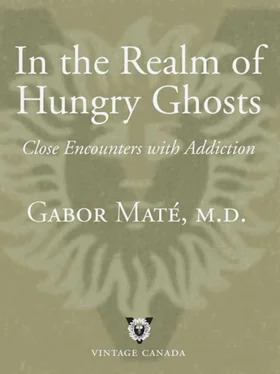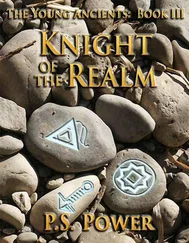My workaholism and compact disc shopping have been only the most consistent forms of escape my mind chooses when it’s uncomfortable. There have been other behaviours just as compulsive and just as impulsive. I see now that the underlying anxiety and sense of emptiness have been pervasive. Emotionally they take the shape of chronic, low-grade depression and irritability. On the thought level, they manifest as cynicism—the negative side of the healthy skepticism and independent thinking I’ve always valued. Behaviourally they mask themselves as hypomanic energy or as lethargy, as the constant hankering for activity or for oblivion. When the ordinary, everyday escape mechanisms fail to satisfy, I plunge into my overtly addictive patterns. If I had greater pain and fewer resources, if I had been less fortunate in the circumstances of my nurturing environment, I might well have been impelled to turn to drugs.
Compassionate curiosity directed toward the self leads to the truth of things. Once I see my anxiety and recognize it for what it is, the need to escape dwindles. It is clear to me that the sense of threat and fear of abandonment that make up anxiety were, in my case, programmed in the Budapest ghetto in 1944. Why attempt to escape some old brain pattern laid down when I was a frightened infant during a terrible time in history? It’s there and the circuits in which its wordless stories are embedded are indelibly a part of my brain. It doesn’t need to go away—indeed, it won’t go away, not completely. But I can transform my relationship to it, become more intimately related to it. I can even gain some mastery over it, which means noticing it without allowing it to control my moods or behaviours. Similarly, I don’t have to take on the impossible task of erasing the addictive impulses that arose from early acquired brain patterns—but I can transform my relationship to them, as well. Essential to any such transformations is a letting-go of judgment and self-condemnation.
Psychiatrist and psychoanalyst Anthony Storr has written about the value of allowing buried emotions to emerge without fear:
When a person is encouraged to get in touch with and express his deepest feelings in the secure knowledge that he will not be rejected, criticized, nor expected to be different, some kind of rearrangement or sorting-out process often occurs within the mind which brings with it a sense of peace; a sense that the depths of the well of truth have really been reached. 3

What is the first step to take once self-compassion allows the truth to emerge? Inevitably, it’s the Step One taught by Alcoholics Anonymous and other Twelve-Step programs. Twelve-Step methods are not for everyone, and they may not be the only route out of addiction, but the principles on which they are based are common to any successful program of recovery.
“We admitted we were powerless over alcohol; that our lives had become unmanageable” is the classic AA formulation. Mindful of the fundamental similarity of all addictions, one can broaden that to say, “I admit I am powerless over my addiction process.” That is, “I fully acknowledge that my cravings and behaviours have been out of control and that my inability to regulate them has led to dysfunction and chaos in important areas of my life. I no longer deny their impact on myself or my coworkers or my loved ones, and I admit my failure to confront them honestly and consistently.” (A friend of mine, Anne, who is a long-time member of AA, cautions against my reformulation of the “ we admitted” to “I admit.” “The first word is plural for a reason,” she says. “If I’m an addict and if I’m left alone to my own resources, then I’m pretty much lost.”)
I have been reluctant to take this step until recently, despite the fact that I’ve not had a problem admitting and describing my addictive tendencies either in private or in public. The difficulty has been threefold. First, since I pride myself on a strong intellect, I’ve resisted accepting that I’m powerless over any mental process. On the contrary, it is in the nature of the ego to turn anything to its advantage. Even the public disclosure of my addictive patterns has served to reassure me of my sincerity and honesty and “courage.” Audiences greet such self-disclosure with nods, appreciative smiles and applause. But real courage does not lie in speaking about addiction; it resides in actively doing something about it—and that, until very recently, I have not been prepared to take on.
Second, in focusing on the most visible compulsive behaviours, such as CD shopping, book bingeing or workaholism, I could still permit myself to ignore how addictive patterns have permeated much of my functioning. Narrowing it down to a few “problematic” issues has allowed me to deny that the addiction process shows up in numerous aspects of my daily existence. There are many things I do well and many tasks I accomplish, I could assure myself, so there is no cause for me to admit a loss of control. In other words, I have not wanted to accept that, at times, my life is made unmanageable by my own behaviours. In the absence of compassionate curiosity, any such admission brings up too much shame.
Finally, whenever I have felt wooden or alienated in the intimate areas of life, I’ve seen myself as deprived, rather than owning the reality that I create the sense of deprivation internally. For example, I have blamed my wife, Rae, for not satisfying my expectations instead of taking responsibility for the burdens I impose on our relationship through poor self-regulation and lack of differentiation (my capacity to hold on to a sense of self while interacting with Rae and others). That leaves me free to use the addictions for self-soothing and to justify doing so by citing my “unmet” needs. In other words, the consequences of my own wilful refusal to be a mature, self-regulating adult became my rationale for pursuing addictive behaviours. As I write about this, the image of a whirling puppy snapping at its own tail comes to mind.
There is no moving forward without breaking through the wall of denial—or, in the case of such an obstinate and slippery mind as mine, breaking through several walls, whose existence I do not even want to acknowledge.
CHAPTER 30

The Internal Climate

God does not change people’s lot until they first change what’s in their own hearts.
The Qur’an (13:11)
No organism in nature is separate from the system in which it lives, functions and dies, and no natural process can be understood in isolation from its physical and biological context. From an ecological perspective, the addiction process doesn’t happen accidentally, nor is it preprogrammed by heredity. It is a product of development in a certain context, and it continues to be maintained by factors in the environment. The ecological view sees addiction as a changeable and evolving dynamic that expresses a lifelong interaction with a person’s social and emotional surroundings and with his own internal psychological space.
Healing, then, must take into account the internal psychological climate—the beliefs, memories, mind-states and emotions that feed addictive impulses and behaviours—as well as the external milieu. In an ecological framework recovery from addiction does not mean a “cure” for a disease but the creation of new resources, internal and external, that can support different, healthy ways of satisfying one’s genuine needs. It also involves developing new brain circuits that can facilitate more adaptive responses and behaviours.
Читать дальше














